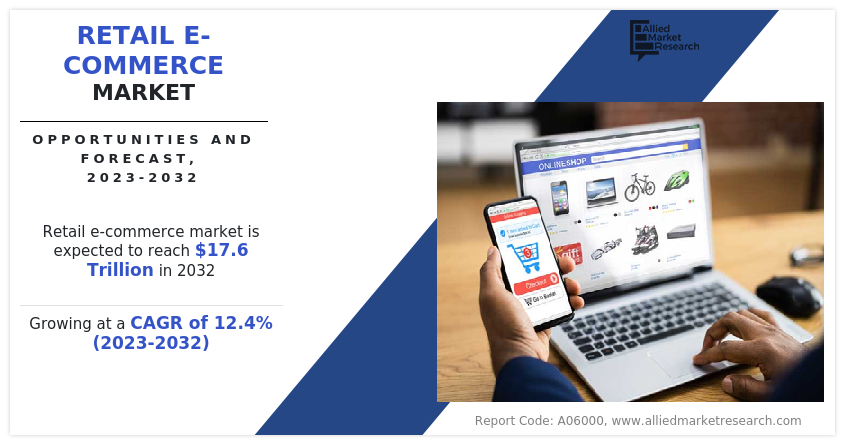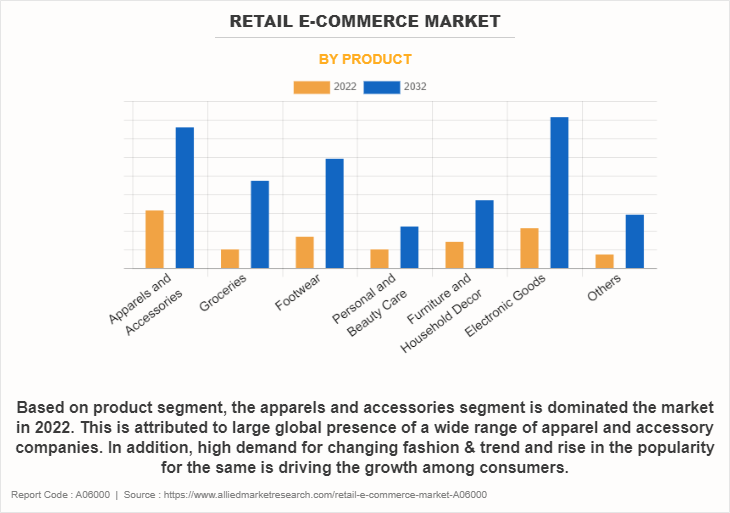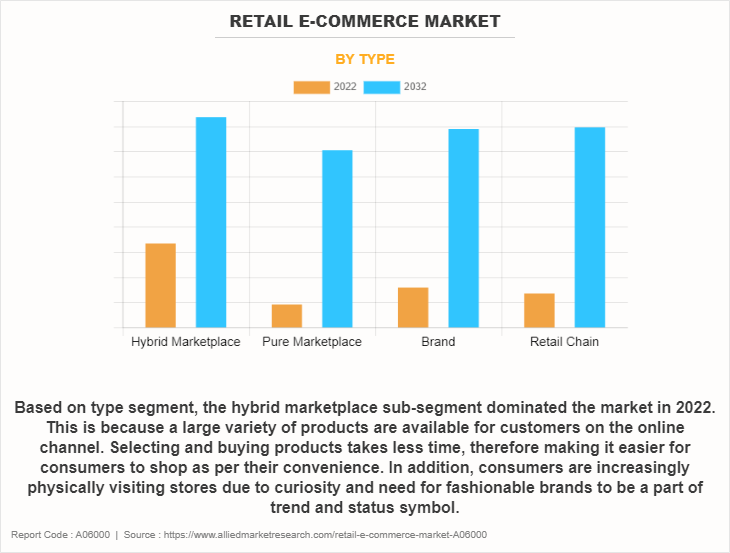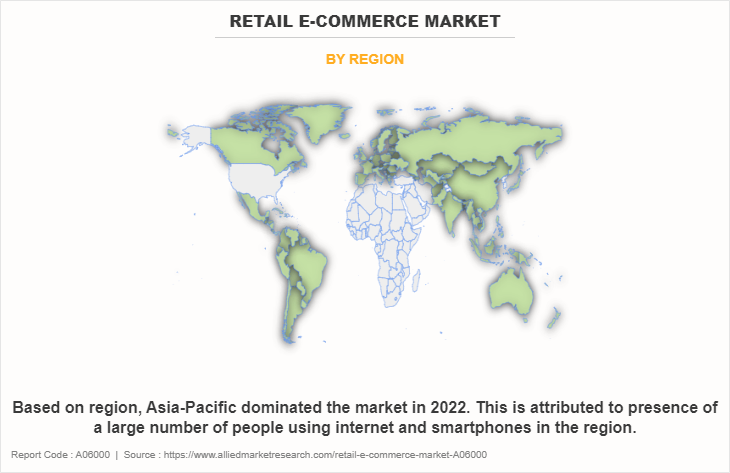Retail E-commerce Market Research, 2032
The global retail e-commerce market was valued at $5.6 trillion in 2022, and is projected to reach $17.6 trillion by 2032, growing at a CAGR of 12.4% from 2023 to 2032.
Retail e-commerce involves buying & selling of products through online platforms and channels. In retail e-commerce, direct selling of products takes place. Individual consumers browse, select and purchase products by using computer devices, smartphone devices, and tablet devices. Furthermore, retail e-commerce platforms provide different features such as listing of products, management of inventory, processing of order, integration of payment. Moreover, mobile applications and responsive websites offer retail e-commerce services. In addition, digital payment methods are being used in e-commerce technology to make payment convenient and easier. Furthermore, artificial intelligence and machine learning tools are being used for e-commerce technology for customer support, demand forecasting, fraud detection, and data analytics to optimize marketing strategies in retail e-commerce technology.

Banks and financial institutions are using e-commerce platforms on a major basis. Customers check account balances, implement money transfer, pay bills, and insurance premiums through the internet. Furthermore, individuals carry out trading in stocks online and get information about stocks to trade in from websites that display news, charts, performance reports and analyst ratings of companies. Supply chain operations use e-commerce for electronic exchange, sale & purchase of goods, exchange of market information, inventory control, and others.
E-commerce is used for various online auctions. The technology brings a large number of people from different geographical locations, thus enabling trading of products at negotiated price in the auction. E-commerce technology helps in online marketing activities such as fixing price, negotiating price, enhancing product features, and building strong customer relationships as this data is leveraged to provide customers a tailored and enhanced purchase experience.
Key factors such as rise in AI & voice recognition technologies and rise digital payments are significant factors driving the growth of this market. However, increase in data thefts over e-commerce platforms is hampering market growth. On the contrary, rise in headless and application programming interface-based e-commerce is providing an opportunity for the market growth.
The report focuses on growth factors, restraints, and trends of the retail e-commerce market analysis. The study provides Porter’s five forces analysis to understand the impact of various factors such as the bargaining power of suppliers, competitive intensity of competitors, threat of new entrants, threat of substitutes, and bargaining power of buyers on the retail e-commerce market.
Segment Review
The retail e-commerce market is segmented into product, type, and region. By product, the market is divided into apparel & accessories, groceries, footwear, personal & beauty care, furniture & household decor, electronic goods, and others. According to type, it is categorized into hybrid marketplace, pure marketplace, brand, and retail chain. Depending on region, the retail e-commerce market is studied across North America, Europe, Asia-Pacific, Latin America, and Middle East & Africa.

By product, apparel and accessories dominated the retail e-commerce market in the year 2022. This is attributed to large global presence of a wide range of apparel and accessory companies. In addition, high demand for changing fashion & trend and increase in the popularity for the same is driving the growth among consumers. However, the groceries segment is growing at an increasing rate in the retail e-commerce market forecast. This is related to increasing convenience for people to order groceries from their homes rather than physically going to the retailer which is time consuming.

Depending on type, the hybrid marketplace dominated the retail e-commerce market in 2022. A large variety of products are available for customers on the online channel. Selecting and buying of products takes less time, therefore making it easier for consumers to shop as per their convenience. In addition, consumers are increasingly physically visiting stores due to curiosity and need for fashionable brands to be a part of trend and status symbol. However, the pure marketplace segment is growing in the retail e-commerce market outlook, due to removal of the lockdown restrictions and high curiosity among people to visit the market to physically check the products.

According to the region, Asia-Pacific dominated the retail e-commerce market in 2022 due to presence of large number of technology-oriented people and heavy use of digital devices in the region. However, the Middle East and Africa is growing at an increasing rate due to presence of high-speed internet and increase in the presence of brand manufacturing companies.
The report analyzes profiles of key players operating in the retail e-commerce market such as Alibaba Group Holding Limited, E Bay Inc., The Kroger Co., Dba Rakuten, Walmart Inc., Coupang Corp, Wayfair Inc., Etsy, Inc., Amazon. com Inc., and Otto GmbH & Co KG. These players have adopted various strategies to increase their market penetration and strengthen their position in the retail e-commerce industry.
Market Landscape and Trends
Augmented reality is changing the game for retail e-commerce market. The technology is helping users to witness the product and realize how it appears while using and wearing it. Furthermore, rise of voice search is creating an opportunity for e-commerce businesses in terms of keyword and content. Moreover, rise in artificial intelligence and machine learning technologies are making it convenient for customers to provide automated & personalized shopping experiences by delivering relevant content to different consumer segments on a macro level and micro level.
Key Industry Developments
Recent Product Launch in Retail e-commerce Market Share
In April 2023, Anko, an Australian brand launched in the Amazon India e-commerce platform to deliver high quality products to the Indian consumers.
Recent Acquisition in Retail e-commerce Market Growth
In July 2023, Etsy Inc. completed the acquisition of Brazilian company Elo7. Elo7 is a market that deals in hand crafted goods. The acquisition was completed by investing $217 million. The main aim for this strategic implementation is to expand the company’s geographical presence outside the U.S.
Top Impacting Factors
Rise in Artificial Intelligence (AI) and Voice Recognition
Growing advancements in technology such as artificial intelligence and voice recognition are driving the growth of this market. Artificial intelligence technology helps retailers to analyze behavior and preferences. In addition, technology is creating a very personalized shopping experience for customers. Furthermore, voice recognition provides an interface for customers to create a very suitable and convenient environment. In addition, AI technology is analyzing customer purchase history to suggest relevant notifications and products to the customer, thus increasing customer engagement. Moreover, voice activated devices are using AI to provide more personalized product recommendation through natural language processing (NLP). In addition, voice recognition technology is helping users to make purchases through voice command. Therefore, all these factors are expected to propel the growth of the retail e-commerce market size during the forecast period.
Growth in Digital Payments
Consumers are finding it convenient to make payments through payment gateways such as UPI, credit card, debit card, and others. Furthermore, customers from various countries are making purchases without the restriction of traditional payment methods. In addition, rise of smartphones is again pushing the market growth by providing digital wallets and mobile payment apps. Moreover, security features such as encryption & authentication protocols makes digital payments strongly secure. In addition, wide range of options are being offered through digital payments such as credit card payment option, debit card payment option and digital wallet applications such as G-Pay, Amazon Pay, Apple Pay, online banking feature, and other alternative payment methods, thus reaching different consumer preferences. Hence, considering the above information, it is highly evident that these factors enhance the retail e-commerce industry growth during the forecast period.
Increasing Data Thefts on E-commerce Platform
Data theft is affecting consumer trust over e-commerce platforms. Furthermore, high costs are associated with data theft. Costs include expenses related to incident investigation, security measure implementation, and potential legal actions. In addition, data theft leads to regulatory compliance issues, thus forcing regulatory bodies to impose penalties over e-commerce platforms. Moreover, compromised vendor and supplier data leak severely affect the entire ecosystem of retail e-commerce platform. Therefore, these factors create chances to hamper retail e-commerce industry growth for the forecast period.
Rise in Headless and Application Programming Interface (API) based E-commerce
Headless e-commerce separates front-end layer from back-end layer of e-commerce. The decoupling feature allows retailers to implement experimentation in relation to front-end technologies. The feature helps redesign user interfaces and in the adoption of changing design trends without iterating the basic function of e-commerce. Furthermore, application programming interface provides rapid innovative feature by combining various tools and technologies within the e-commerce architecture, thus providing an accessibility to e-commerce platforms survive and deal with various challenges in the market competition. Moreover, headless e-commerce is facilitating the content and commerce delivery through various channels and devices. Retailers reach a wide variety of global consumers through mobile applications, voice interfaces, and social media platforms. Hence, all these factors are increasing growth of retail e-commerce market opportunity during the forecast period.
Key Benefits For Stakeholders
- This report provides a quantitative analysis of the market segments, current trends, estimations, and dynamics of the retail e-commerce market analysis from 2022 to 2032 to identify the prevailing retail e-commerce market opportunities.
- The market research is offered along with information related to key drivers, restraints, and opportunities.
- Porter's five forces analysis highlights the potency of buyers and suppliers to enable stakeholders make profit-oriented business decisions and strengthen their supplier-buyer network.
- In-depth analysis of the retail e-commerce market segmentation assists to determine the prevailing market opportunities.
- Major countries in each region are mapped according to their revenue contribution to the global market.
- Market player positioning facilitates benchmarking and provides a clear understanding of the present position of the market players.
- The report includes the analysis of the regional as well as global retail e-commerce market trends, key players, market segments, application areas, and market growth strategies.
Retail E-commerce Market Report Highlights
| Aspects | Details |
| Market Size By 2032 | USD 17.6 trillion |
| Growth Rate | CAGR of 12.4% |
| Forecast period | 2022 - 2032 |
| Report Pages | 400 |
| By Product |
|
| By Type |
|
| By Region |
|
| Key Market Players | Walmart Inc., Dba Rakuten, Amazon. com Inc., Etsy, Inc., ALIBABA GROUP HOLDING LIMITED, Coupang Corp, Otto GmbH & Co KG., Wayfair Inc., E Bay Inc., The Kroger Co. |
Analyst Review
As per the insights of the top level CXOs, retail e-commerce market refers to a dimension in which several businesses sell and buy goods & services through online stores. Retail e-commerce is a brick- and-mortar store apart from being an online entity where consumers visit physically and buy products & services. There is a significant difference between retail e-commerce and e-commerce. Retail e-commerce only deals with buying and selling of goods & services in an online mode. However, e-commerce deals with extensive range of activities such as online banking, investing management, money management, online supply chain management, web hosting services, content management systems, digital marketing platforms, and data collecting systems.
Furthermore, CXOs added that market players are adopting strategies such as product launch and acquisition to enhance their services in the market and improve customer satisfaction. For instance, in September 2023, The Kroger Co., an American retail company, launched harvest apple. Harvest apples include different varieties of apples such as spiced apple snack mix, spiced apple pie seasoned pretzels, caramel apple cheesecake sandwich cookies, spiced apple pie cream, and others. Furthermore, in April 2022, The Kroger Co. partnered with Bed Bath & Beyond, an American retail company that specializes in housewares, furniture, and specialty products. The strategy was put into action to improve the variety of products to be offered to the consumers. Moreover, in March 2023, Dba Rakuten partners with The Carrefour Group, a global food retailer company. The strategic implementation is intended to enhance Carrefour Group's position in the e-commerce sector. Dba Rakuten stands to gain by offering high-quality food products through their e-commerce platform. Therefore, such strategies are expected to boost the growth of the retail e-commerce market size in the upcoming years.
The report analyzes profiles of key players operating in the retail e-commerce market such as Alibaba Group Holding Limited, E Bay Inc., The Kroger Co., Dba Rakuten, Walmart Inc., Coupang Corp, Wayfair Inc., Etsy, Inc., Amazon. com Inc., and Otto GmbH & Co KG. These players have adopted various strategies to increase their market penetration and strengthen their position in the retail e-commerce market.
Augmented reality is changing the game for e-commerce market. The technology is helping users to witness the product and realize how it appears while using and wearing it. Furthermore, rise of voice search is creating an opportunity for e-commerce businesses in terms of keyword and content. Moreover, rise in artificial intelligence and machine learning technologies are making it convenient for customers to provide automated & personalized shopping experiences by delivering relevant content to different consumer segments on a macro level and micro level.
Hybrid marketplace is the leading application of Retail E-commerce Market.
Asia-Pacific is the largest regional market for Retail E-commerce.
$5,578.24 billion is the estimated industry size of Retail E-commerce.
Alibaba Group Holding Limited, E Bay Inc., The Kroger Co., Dba Rakuten, Walmart Inc., Coupang Corp, Wayfair Inc., Etsy, Inc., Amazon. com Inc., and Otto GmbH & Co KG.
Loading Table Of Content...
Loading Research Methodology...



